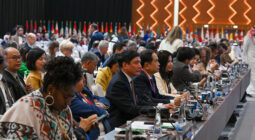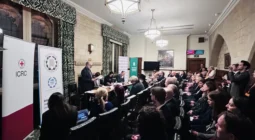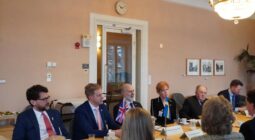

60% of women MPs from Asia-Pacific report online gender-based violence
A major new study by the Inter-Parliamentary Union (IPU), in partnership with the Commonwealth Parliamentary Association (CPA) and the ASEAN Inter-Parliamentary Assembly (AIPA), has exposed the pervasive nature of sexism, harassment and violence against women in parliaments across the Asia-Pacific region.
The report, Sexism, harassment and violence against women in parliaments in the Asia-Pacific region, is based on confidential interviews with 150 women parliamentarians and parliamentary staff from 33 countries.
The study highlights the alarming increase in online gender-based violence compared to the rates reported in previous IPU studies.
60% of women parliamentarians surveyed for the current study have been targeted by hate speech, disinformation, image-based abuse, or unwanted disclosure of personal data (doxing) online. This is the highest rate for this type of abuse compared to other IPU regional studies.
The study also reveals the following findings:
. 76% of women parliamentarians and 63% of parliamentary staff have experienced psychological violence.
. Sexual violence is also prevalent, with 25% of women parliamentarians and 36% of parliamentary staff reporting such incidents.
. Economic violence or damage to women’s belongings has affected 24% of women parliamentarians and 27% of parliamentary staff, while physical violence was reported by 13% and 5% respectively.
Some women more at risk than others
According to the study, certain groups – women under 40, women from minority backgrounds and unmarried women – face disproportionately higher rates of violence.
Opposition women MPs also report higher rates of psychological and sexual violence.
Parliament is the primary site of harassment
More than half the incidents of sexual harassment against women MPs took place on parliamentary premises and were committed by male parliamentarians.
However, for the women MPs in the study, 85% of cases of online attacks, 59% of threats and 45% of psychological harassment come from the public.
Positive steps forward
Several parliaments in the region have begun taking steps to prevent and respond to such actions, including introducing confidential reporting mechanisms and support services. This is the case, for example, in Australia, Fiji, India, Maldives, Philippines, Republic of Korea, New Zealand, Sri Lanka and Thailand.
Regional comparison reveals similar rates of violence across the world
This new study follows previous IPU reports, starting in 2016 with a global study, followed by a 2018 report on European parliaments and a 2021 report on African parliaments.
Prevalence of violence among women MPs in the three regional surveys:
| Asia-Pacific (2025) | Africa (2021) | Europe (2018) | |
| Psychological violence | 76% | 80% | 85% |
| Sexual violence | 25% | 39% | 25% |
| Physical violence | 13% | 23% | 15% |
| Economic violence | 24% | 29% | 14% |
Quotes
Martin Chungong, IPU Secretary General said: “Violence and sexism against women in politics is a direct assault on democracy itself. The courageous women who have come forward to denounce abuse deserve our unwavering support. Parliaments must be sanctuaries for healthy debate and law-making. We have the tools to support them. It is our responsibility to foster a political climate where women can thrive without the shadow of violence.”
Stephen Twigg, CPA Secretary-General said: “Sexism, violence and harassment against women in politics have a negative impact on the lives of women Parliamentarians, parliamentary staff, their families and communities. Parliaments have a duty to show leadership and set an exemplary standard for society. We are determined to work together to empower Parliaments by providing relevant resources to ensure a zero-tolerance approach to all forms of gender-based violence.”
Siti Rozaimeriyanty Dato Haji Abdul Rahman, AIPA Secretary General said: “Violence against women in politics remains a significant barrier to their full and meaningful participation, affecting the inclusivity of governance. Addressing these challenges requires proactive measures from political institutions to foster a safe and supportive environment where women can engage without fear or constraint. Creating an enabling and secure space for women in politics is not just about fairness—it requires a shared commitment, not only within parliaments but also across political institutions, to build more inclusive and forward-looking governance that benefits society as a whole.”






